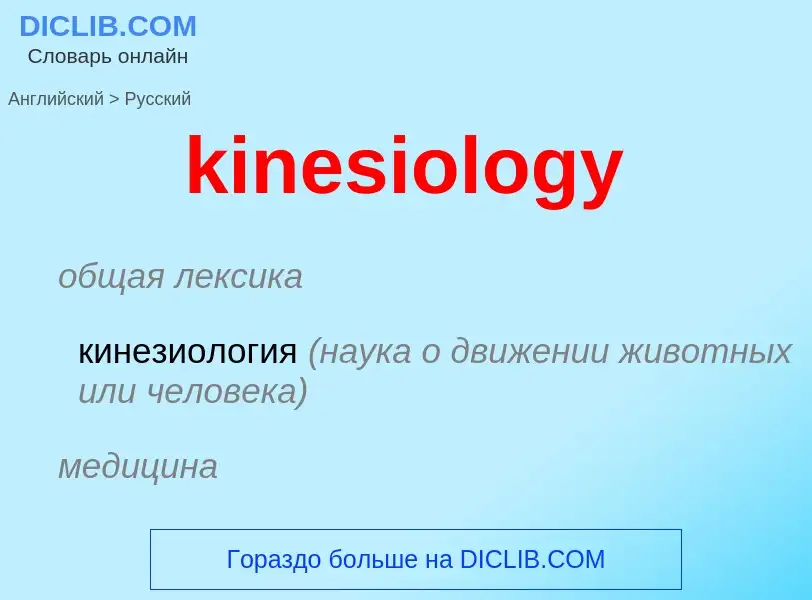Перевод и анализ слов искусственным интеллектом ChatGPT
На этой странице Вы можете получить подробный анализ слова или словосочетания, произведенный с помощью лучшей на сегодняшний день технологии искусственного интеллекта:
- как употребляется слово
- частота употребления
- используется оно чаще в устной или письменной речи
- варианты перевода слова
- примеры употребления (несколько фраз с переводом)
- этимология
kinesiology - перевод на русский
общая лексика
кинезиология (наука о движении животных или человека)
медицина
кинезиология (физиология движений)
учение о мышечных движениях
['flekʃ(ə)n]
общая лексика
флексия
сгибание
изгиб
вторая производная
медицина
наклон
существительное
общая лексика
сгиб, изогнутость
медицина
сгибание
техника
изгиб
математика
кривизна
изгиб (линии, поверхности)
кривизна, изгиб (линии, поверхности)
грамматика
флексия
окончание
Определение
Википедия

Kinesiology (from Ancient Greek κίνησις (kínēsis) 'movement', and -λογία -logía 'study of') is the scientific study of human body movement. Kinesiology addresses physiological, anatomical, biomechanical, pathological, neuropsychological principles and mechanisms of movement. Applications of kinesiology to human health include biomechanics and orthopedics; strength and conditioning; sport psychology; motor control; skill acquisition and motor learning; methods of rehabilitation, such as physical and occupational therapy; and sport and exercise physiology. Studies of human and animal motion include measures from motion tracking systems, electrophysiology of muscle and brain activity, various methods for monitoring physiological function, and other behavioral and cognitive research techniques.





![The analysis of recorded human movement, as pioneered by [[Eadweard Muybridge]], figures prominently in kinesiology. The analysis of recorded human movement, as pioneered by [[Eadweard Muybridge]], figures prominently in kinesiology.](https://commons.wikimedia.org/wiki/Special:FilePath/Muybridge human male walking animated.gif?width=200)


.jpg?width=200)
.jpg?width=200)

![Hyperextended finger in [[hypermobility spectrum disorder]] Hyperextended finger in [[hypermobility spectrum disorder]]](https://commons.wikimedia.org/wiki/Special:FilePath/Hypermobility-10.jpg?width=200)
![Hyperextended thumb in [[hypermobility spectrum disorder]] Hyperextended thumb in [[hypermobility spectrum disorder]]](https://commons.wikimedia.org/wiki/Special:FilePath/Hypermobility-11.jpg?width=200)
![The [[lotus position]] of [[yoga]], demonstrating ''external rotation'' of the thigh at the hip. The [[lotus position]] of [[yoga]], demonstrating ''external rotation'' of the thigh at the hip.](https://commons.wikimedia.org/wiki/Special:FilePath/Babaji.jpg?width=200)


![The swinging action made during a [[tennis serve]] is an example of ''circumduction'' The swinging action made during a [[tennis serve]] is an example of ''circumduction''](https://commons.wikimedia.org/wiki/Special:FilePath/Heather Watson Serve.jpg?width=200)
![A [[ballerina]], demonstrating ''plantar flexion'' of the feet A [[ballerina]], demonstrating ''plantar flexion'' of the feet](https://commons.wikimedia.org/wiki/Special:FilePath/017 'Ballerina' 18x24 oil on linen.jpg?width=200)

![Praying Hands]]'' by [[Albrecht Dürer]], demonstrating ''dorsiflexion'' of the hands. Praying Hands]]'' by [[Albrecht Dürer]], demonstrating ''dorsiflexion'' of the hands.](https://commons.wikimedia.org/wiki/Special:FilePath/Albrecht Dürer Betende Hände.jpg?width=200)










